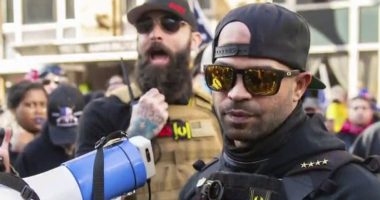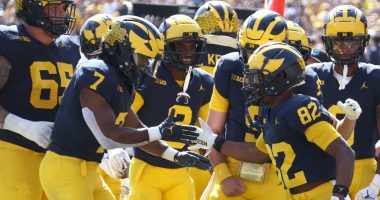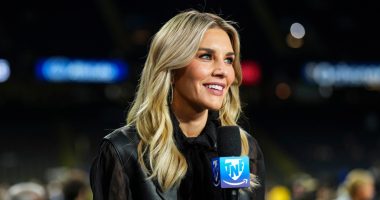
1. I think the way the Cowboys lost Sunday is going to leave a mark. Down five, 46 seconds left at arch-rival Philadelphia. Four plays and three big penalties on the Eagles bring Dallas to the Philly six-yard line with 26 seconds left. Eighty yards! To the verge of victory against the best team in the game! Dallas win probability with 46 seconds left: 3.7 percent, per Next Gen Stats. Dallas win probability, with 27 seconds left at the Eagles’ six with no timeouts left: 48.6 percent. A coin flip, basically. Then false start, sack, incomplete, delay of game, pass short of the end zone, end of game. Yikes.
2. I think kudos go to the Eagles, to be sure. But to be great, you’ve got to make great plays in big moments. The Cowboys just don’t do that.
Eagles ‘find a way to win’ in Week 9 vs. Cowboys
The FNIA crew recap the Philadelphia Eagles victory over the Dallas Cowboys in Week 9 and how they keep finding new ways to win every week.
3. I think this is absurd. Patrick Ricard fined $21,694 for playing football. Seriously: Who is making these idiotic rulings on the fines for normal football plays?
4. I think it’s a shame about Daniel Jones’ knee injury, both for him and for the future of the Giants. This was the golden year for Jones to prove to Brian Daboll in the coach’s second year that the Giants didn’t have to worry about the quarterback position. Now they do. Much of this is the team’s fault because Jones never had a chance behind a terrible offensive line from the start this year. But now, GM Joe Schoen has to do his homework on quarterbacks because he isn’t sure about Jones. I’m sure Schoen didn’t love the fact that he was photographed scouting the Washington-USC game Saturday in Los Angeles because clearly two of the best quarterback prospects, Caleb Williams and Michael Penix Jr., are on those teams. So now the Giants likely will have a significant decision to make after what’s going to be an awful season. The future of a lot of players, coaches and executives might be at stake on the Giants decision at quarterback.
5. I think real life interceded on my trip to Frankfurt. I met an Israeli football commentator, from Haifa, Israel, covering the game on his first trip outside the country since the Oct. 7 Hamas attack on the country. “I cry every day,” said Ori Shterenbach, who is also involved in the organization of football on all levels in Israel and is the commissioner of the eight-team high school football league in the country. He told me three players and one coach on the national football team were killed in the attack. “Two of the players were at the [concert] that was attacked,” Shterenbach said. “They ran for shelter into a building, but the attackers threw grenades and killed some people, then went into the building and shot the others. One player played dead for 10 hours. That’s how he survived and told the story.” Shterenbach got emotional talking about it. “We need football at a time like this,” he said. “We love sports, and people need to get their minds off what’s happening in our world for a while right now.”
6. I think, for those who say Pittsburgh’s 5-3 record is fool’s gold and they’ll drop out of the race any day now, I bring you the next six games on their schedule: Packers at home, at Browns, at Bengals, Arizona home, New England home, at Indy. I feel an 8-6 team making a stretch run.
7. I think J.J. Watt hit it on the head the other day, watching Steelers-Titans: “Do not go shotgun from the 1-yard line. Ever!!” I do not understand a team having the ball three feet from the goal line and choosing to take the snap at the five- or six-yard line. Help me with that, please.
8. I think this must be Lincoln Riley’s welcome to the Big Ten moment: USC, in the span of 29 days starting next September, plays at Michigan, at Minnesota and at Maryland. I don’t care what the financials say. A California team playing in the Big Ten is a dumb idea.
9. I think there’s a very good chance that it’s been years—like, 10 or 15—that the NFL has had so many quarterbacks the general public hasn’t heard of start games. Clayton Tune (Arizona rookie fifth-rounder, at Cleveland), Jaren Hall (Minnesota rookie fifth-rounder, at Atlanta), Aidan O’Connell (Las Vegas rookie fourth-rounder, versus the Giants), and I’m not even including Tyson Bagent (undrafted Chicago rookie, at New Orleans) because of his recent run of fame. Tune, O’Connell, Hall and Bagent joined relative newbies and/or unknowns like Will Levis, Kenny Pickett, Taylor Heinicke, Jordan Love, Sam Howell, C.J. Stroud and Bryce Young. Nine of the league’s 14 games this weekend featured an unknown or young and unproven passer.
Stroud details crucial late drive against the Bucs
C.J. Stroud talks through the final moments against the Buccaneers, praising his teammates for stepping up, after he put together a record-breaking performance.
10. I think these are my other thoughts of the week:
a. RIP, Bobby Knight, dead of complications from Alzheimer’s Disease at 83.
b. We’re just getting to the point when sports fans who are 40 and younger probably won’t get the full meaning of Bobby Knight to our sports scene, and in our society. Think about it: Those of us who were magnetized by “A Season on the Brink,” John Feinstein’s book about a season, 1985-’86, with the Knight-coached Indiana basketball team, saw Knight at the peak of his acerbic, angry, explosive, brilliant, bullying and unchanging self. That was almost four decades ago, so it’s understandable that many will note the death of Knight and wonder how possibly could the basketball coach at Indiana be one of the five most dominant people in sports for 15, 20 years. He just was.
c. I remember my one session with Knight. I covered college basketball before football in the early eighties at the Cincinnati Enquirer, and before a weeknight game in Bloomington, I spent an hour with him. He had something on his mind, and at that time, the Enquirer was a big regional paper with some influence. He was concerned with the rising cheating in recruiting, and he spent a good half-hour railing against it. I expected a volatile Knight. I got Knight the educator. I don’t think he raised his voice once in the time I sat in with him. He deserved criticism, and lots of it, but there was good to Knight too.
d. Story of the Week: John Feinstein, in The Washington Post, on the man he knew so well after “A Season on the Brink.” Wrote Feinstein:
I can’t possibly overstate how important Knight was in my life. The access he gave me for “A Season on the Brink” allowed my first book, about Indiana’s 1985-1986 season, to become a No 1. bestseller, which has allowed me to pick and choose book topics for the past 38 years. Not once did Knight back away from the access, even during some difficult moments for his team. Although he didn’t speak to me for eight years after the book’s publication — upset, of all things, with seeing profanity in the book — he eventually decided to “forgive” me, and we had a distant though cordial relationship for the rest of his life.
e. Feinstein relates a story of how a player, Calbert Cheaney, once committed to play at Evansville, which was coached by a former Knights player, Jim Crews, who played for Knight and coached on his staff for eight years. Knight told his staff to call Cheaney to see if he’d want to come to Indiana instead. Cheaney did, and Crews called Knight to lash out at him. As Feinstein related:
Knight responded by telling Crews he would be nothing in basketball if not for him. Crews finally said, “You know something, Coach: The saddest part of your life is that you treat your enemies better than you treat your friends.”
f. I’m so sure the James Harden experience is going to go well in L.A.
g. Not.
h. Deion Story of the Week: Jim Trotter of The Athletic on football life at Jackson State post-Deion Sanders.
i. Trotter writes about all sides of the Sanders aftermath. Some good, some bad, some petty. Some feeling of abandonment, but mostly, an overriding feeling that we had a great tradition before Sanders got here, and we’ll have a great one for years in the future.
j. Writes Trotter:
The Athletic attended JSU’s homecoming week to take the temperature of various segments of the fan base. The takeaway can best be described in two words: It’s complicated.
The first thing that needs to be acknowledged is that the Jackson State community does not sit around talking about Sanders. They moved on the moment he left town — not because they feel some kind of way, but because that’s what they do.
The program, in their eyes, is bigger than one man. Always has been, always will be. Take a stroll through the athletic center that Sanders helped design, and there are no pictures of him hanging prominently.
It’s almost as if he were never there — striking considering he seemed to be everywhere during his three seasons. If he wasn’t doing radio shows or podcasts, he was being featured on social media or sitting down with national TV crews. The power of his personality was so great that it attracted “Good Morning America,” “College GameDay,” and “60 Minutes.”
k. A prominent JSU professor, Dr. D’Andra Orey, had the best quote of the story to Trotter, and he’s not alone feeling this way: “My only gripe is he never said thank you when he left.”
l. Sober October Story of the Week: (You mean October’s over?) Rachel Fairbank of National Geographic on something I believe one or two of my readers might value—“When you go sober for even a month, your body will change. Here’s how.”
m. Wrote Fairbank:
After giving up alcohol, changes will start to take effect within weeks. This includes in the liver, which can start to reverse the damage done in most of the four stages of alcohol-related liver disease—which starts with the accumulation of fat, then progresses to chronic inflammation, which leads to scarring, and ultimately results in cirrhosis. For all but the very final stage, the liver can heal.
“The liver has an enormous regenerative capacity,” Auburn University researcher Paul Thomes [who studies alcohol-induced organ damage] says. “The first three stages [of liver damage] are reversible during abstinence from alcohol.” Abstaining from alcohol can even have some benefits for those with cirrhosis of the liver by halting the progression of the disease and lengthening a patient’s survival, although it won’t reverse the condition.
In a study that followed 94 moderate-heavy drinkers who gave up alcohol for a month, participants experienced improvements in insulin resistance, blood pressure, and weight, compared to their peers who did not abstain. Some of the other benefits of giving up alcohol include improved sleep, improved mood, including a decrease in depression and anxiety.
o. Just a little public service after a weekend when just maybe too much beer was consumed.
p. Baseballnerdness: I wear the same glasses as Rangers manager Bruce Bochy.
q. Kudos, Rangers, on the first World Series win in club history. Happy for Nathan Eovaldi, who loves baseball the way ardent fans love it. It is baseball karma that the biggest win of his life came in the decisive game of a World Series. Glad to see Marcus Semien come out of a decent playoff slump to get hot when the games were the biggest. Good for Chris Young, the brainy former pitcher, who prioritized player/leaders in building this team—Eovaldi, Semian, Corey Seager.
r. I heard something in game three that I really didn’t like from John Smoltz. Gabby Moreno led off the ninth for Arizona, with the DBacks trailing 3-1. Jose Leclerc pitching for Texas. “A home run does nothing. A walk does EVERYTHING.” Huh? A home run makes it 3-2 and brings the tying run to the plate. A walk puts a runner on first base, keeps it 3-1, and brings the tying run to the plate. What would you rather have as the trailing team: a runner at first, down 3-1, or the bases empty, down 3-2? Help me understand the penalty for being down 3-2 instead of 3-1.
s. I get it—you don’t want to walk the leadoff hitter in the bottom of the ninth with a two-run lead. But sometimes, baseball cliches are nothing but misleading.
t. Obit of the Week: Baseball slugger Frank Howard, a staple player of my youth, died last week at 87. Matt Schudel of The Washington Post with a warm remembrance of the American League home run champ in 1968 and 1970.
u. Howard was 6-7 and 260, a Redwood among men. He played baseball and basketball at Ohio State—his 32 rebounds in a game is still an Ohio State record. A genial, gentle giant, and so much fun to watch, because he might hit the ball a mile. Last home run in Washington Senators history in 1971, and then the franchise moved to Arlington, Texas. He then hit the first home run in Texas Rangers history in 1972. Wrote Schudel in the obit:
On Sept. 30, 1971, the Senators played their final game. They were leading the Yankees in the ninth inning, 7-5, when unruly fans stormed the field and began to pick up the bases and pieces of turf. The game was forfeited to the Yankees.
In the sixth inning of the game, Mr. Howard slugged a home run — the last ever hit by a Senator.
“That’s what the fans had come to see,” George Minot Jr., wrote in The Post. “They rolled cheer after cheer upon his broad shoulders. He waved his batting helmet to them before disappearing into the dugout. Then he came out and tossed his cap into the crowd. And he came out again to blow kisses.”
“This is utopia,” Mr. Howard said after the game. “This is the greatest thrill of my life. What would top it?”
v. In 1970, when Howard led all A.L. hitters with 44 homers, I saw a day-night doubleheader on a September Saturday, Senators-Red Sox at Fenway Park. I was in eighth grade, and I came with a Bic Clic and a book—“My Turn at Bat,” by Ted Williams, as told to John Underwood. Williams was Washington’s manager. I was determined to get Williams’ autograph. In the first game of the twinbill, against 22-year-old Red Sox southpaw Ken (brother of George) Brett, Howard batted five times. He struck out five times.
w. When Williams brought the lineup card out to home plate before game two, I positioned myself in the aisle behind the Senators’ dugout. As he turned to come back, I hustled down the steps to row one in probably a two-thirds-empty ballpark, to the corner of the dugout, where Williams would walk down into the dugout. I held up “My Turn at Bat” and I said: “Ted! Can you sign?” Williams looked up at me and said, “Slide it over.” I slid the book across the top of the dugout, and followed by tossing the pen to him. He signed and sent it back. Now that was a cool moment. The book is still on the shelf in my office at home. Memories of Frank Howard spurred that memory of Ted Williams.
x. Happy 36th, Jason Kelce, and 31st, Odell Beckham Jr. (both Sunday). And thinking of Pat Tillman, who would have been 47 today.
Source: | This article originally belongs to Nbcnews.com










